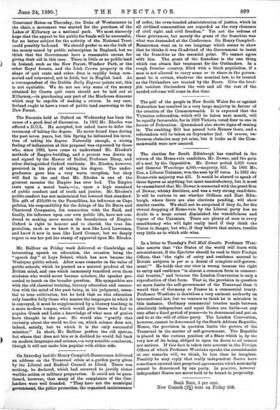Mr. Balfour on Friday week delivered at Cambridge an interesting
speech on education, the occasion being the " speech day " at Leys School, which has now become the Wesleyan public school. After some remarks on the value of public schools, which he praised as a natural product of the British mind, and one which immensely benefited even those students who would never become scholars, the speaker pro- ceeded to touch on the broader question. His sympathies are with the old classical training, literary education and connec- tion with the mind of the past being, in his judgment, essen- tial to true cultivation, but he held that as this education only benefits fully those who master the languages in which it is conveyed, it must be supplemented by a literary teaching in a more modern tongue, which would give those who fail to acquire Greek and Latin a knowledge of what men of genius have thought in the past. He would also "gratify that curiosity about the world we live on, which science does not, indeed, satisfy, but to which it is the only successful minister." In short, Mr. Balfour prefers the old system, but where that does not bite or is disliked he would fall back on modern languages and science,—a very sensible conclusion, though it will not make him popular with either side.


















































 Previous page
Previous page